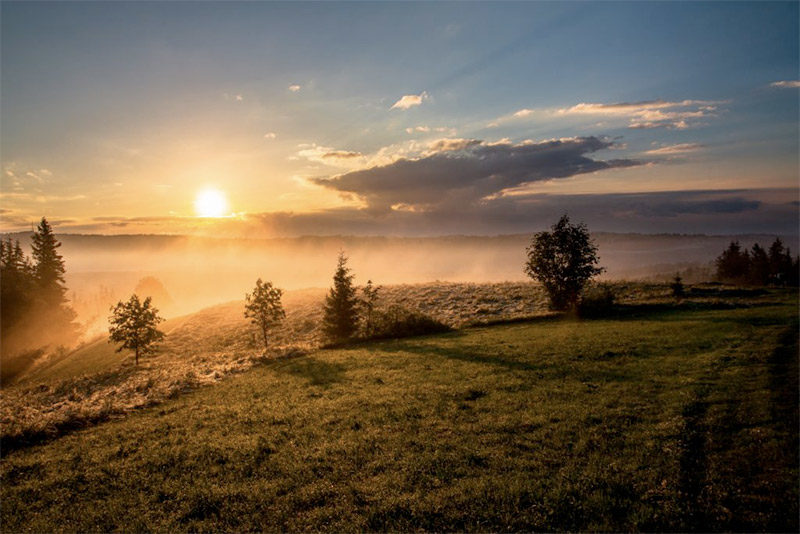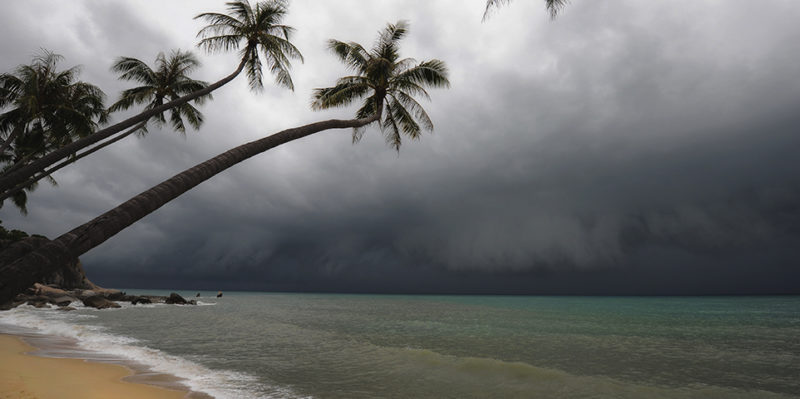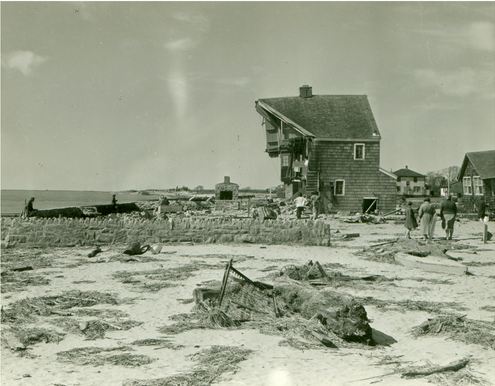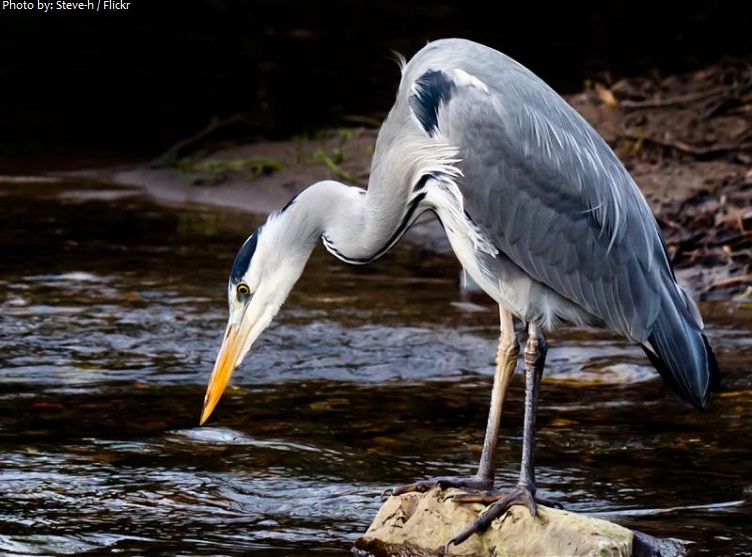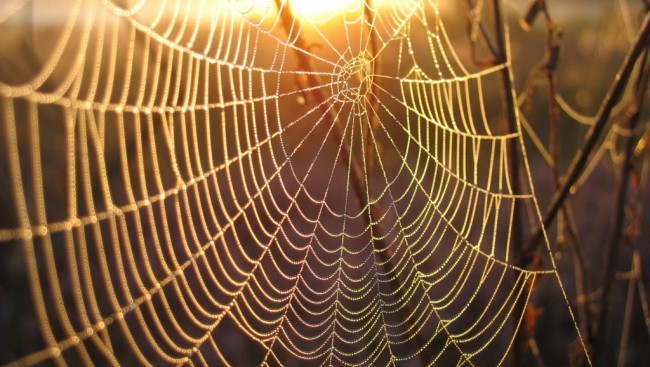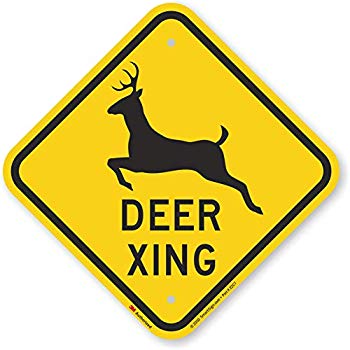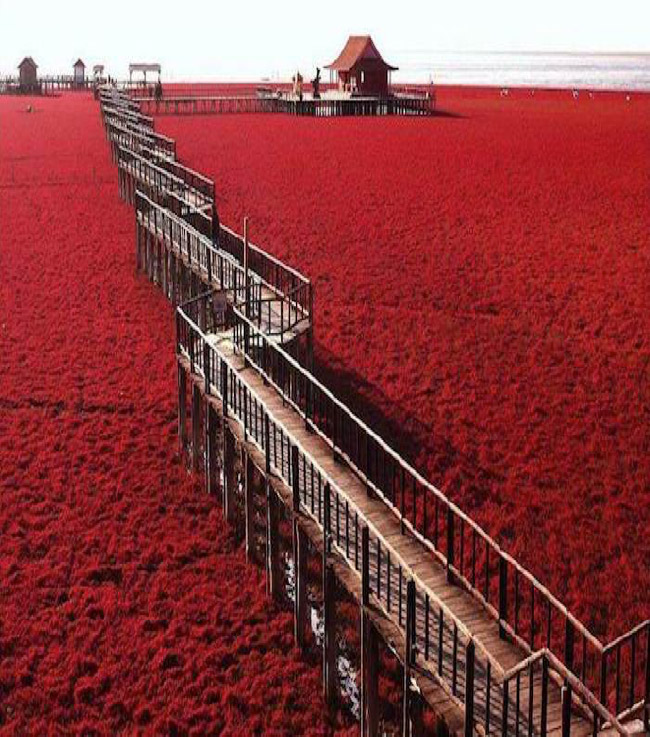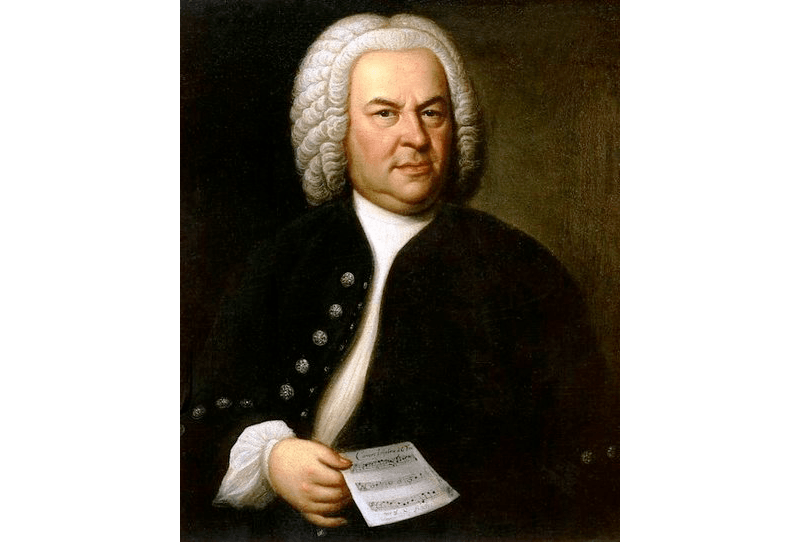Chant for a Hurricane
Birds have left without a song.
Morning light looks yellow and wrong.
Airports close, so does the town.
Winds pick up, trees blow down.
Radios go on and on.
Churches fill, church bells bong.
The people are listening, listening.
Born in a land Saharas away
Crossing an ocean to have its say
Crashing through town like a runaway train
Oh Breaker of Nations rain us your rain
Wind us your winds—of course we’ll complain.
But leave us alive with reason to sing
When you are done chastening, chastening.
John Barr / from National Geographic Book of Nature Poetry
Chant for a Hurricane Read More »
Gloria Visits The Fry House
Never firm the old Victorian,
perched on locust poles, poised
on beach's brink, begins to lean.
(Oddly the rusted chandeliers
are what appear to lean as they decline
to join the general lean to sea.)
With a great complaining of nails
rooms parallelogram, right angles
by the hundreds choose acute, obtuse.
The living room goes first: two picture windows
burst as the picture they were placed to contemplate
comes in the room. The main floor caves.
The upright red piano rolls
out the window, out to sea,
slowly righting to metacenter.
In the slow motion of demolition
walls fold down upon themselves
expressing volume room by room.
Dressers come up hard on seaward walls,
the bedrooms yield beds,
the third floor launches a pool table.
Like stalks the house's piping snaps.
water lines plume, gas lines effuse.
Eased by a wave, then waves,
the pile gets underway. But rubble it is not.
Shedding cedar shakes like scales,
in the exploding surf it is reborn.
The Fry house joins the company
of things that put to sea.
John Barr / from The Hundred Fathom Curve
Gloria Visits The Fry House Read More »
Heron
He comes when the light is right,
banking the pond’s perimeter
to land and step into a statue’s stillness.
When the light is right the fish come in to feed,
feeling it safe to nose among the weeds,
to risk the proximity of feet, of legs
that rise like reeds to a distant body above.
Once I saw him come in heavy rain,
knowing it would roil the fisheye view.
I watched his neck–a question mark–release,
his beak harpoon a startled shape,
and saw it go head-first down the hatch.
Perfect hunger. Perfect hunter. Perfect prey.
I wait for the heron to come.
John Barr / from The New York Times
The Orb Weaver
In the pre-dream of Creation–dingo
savanna, crab surf, serpent arroyo–
I was assigned thicket and air.
Whitetail taught to flee dissent,
coyote to collapse on his prey,
right whale to mouth his meadow's krill,
my trick, to make one thing repeatedly.
Out of this orifice unheard-of muscles
press a cable mile, 8 hands pay out
in junctions that I simply know.
I steeplejack an undulant array's,
a billowing acre's, rungs and radials.
From the host of brother structures in genetic gel,
my radical dance deduces one recalling
by moon the tenure of rails, by noon's blue hole
the 20/20 of a clean kill.
As language was given to man that he may have
dominion yet again, my web
like metaphor its hold makes good on air:
compass rose of indirection,
proof of an occult geometer,
dread nought, round hosanna
shout of spatial glee.
After the maker's heart
I put the merest gloze on air.
Having sutured nothing–nothing
nearly nothing still–I frame
a reference for the flying folk.
Lighthousekeeperlike I tend
this hazard feet above the forest floor.
Each few days, the lattice rent
and apparent with dew, I eat it and renew
(word made flesh, made fresh) its invisibility.
My hands take hold of certain strands,
I settle to see what comes my way:
arielles and tinkerbelles,
a butterfly under double flags of truce,
manic mosquitos, a hoplite bee,
a Mack truck Luna hit the silk.
What happens next, whether to tiny tocsins
or large beats of alarum to come on the run,
whether to spring, fang, decant
is left, I believe, entirely to me.
I see a watchworks, socketed and sprung,
and I say "jeweled movement, motionless."
Immune to vertigo, I say "excused from gravity."
I see my causeways littered with body bags
and I say "Form is hunger, hunger form."
John Barr/The Hundred Fathom Curve: New and Collected Poems
Deer Xing
Sitting on sixty, we moved through Illinois.
In fast slow motion, farm by farm,
Wisconsin, like a realm whose deer
dream cars and leap, came near.
They panic, the wardens say.
but this one was intent,
crossing a lane to charge. The impact
of a deer in the air was a near wreck.
With a buckled front, but otherwise no harm,
we stopped and backed.
Sprawled in the ditch, wide-eyed,
the doe looked surprised that it had died
instead of us. As if that was the accident.
John Barr / from Hundred Fathom Curve
Mss
Since I start things on the margin
–cocktail napkins, cancelled checks,
timetables trying to be reliable–
and since I save it all, I know
there are good words buried and lost
in those fat accordion files, words
that sounded good at the time,
that I promised to get back to,
rhyme trains that never left Grand Central,
monikers that chattered like silverware
at 30,000', sounds struck
sheer of sense–coin of a realm–
from a currency of air, pronounced
like blessings on an express world,
soul puffs, plain mistakes,
angels, working definitions of.
John Barr / from The Hundred Fathom Curve
The Book
There is no Frigate like a Book
to take us Lands away
-Emily Dickinson
I find you in these sunless stacks.
Your poems might be uncommonly fine
but your pages darken to brittleness
and you've never been checked out. Unless
your anchor's weighed and you proceed
to find the harbor of another's mind,
nothing will come of the cargo in your hold.
I stand in the gloom of the unread, and read.
John Barr / from Dante in China
Dante In China
Exiled for life, he conceives the Inferno.
Had his wanderings brought him here–Take Bus 9
for the Red Seabeach– he might have been stunned
to find Nature so unequivocal.
An endless flat grows nothing normal,
while a weed–arterial red–unrolls
a welcome mat to the unwell.
He sees the tidal river crawl
through deep reversals,
looking for the sea.
He walks the Bridge of Nine Turnings.
Posted up ahead, warnings–
in language he cannot divine.
Strutting cranes patrol
the muck, stab for clams–their
shells like voided efforts at immortality.
Flaring well-gas night and day,
towers rise as if to say,
"Pollution can be beautiful."
He cranes to see what all this will become,
beyond the reach of naked eye,
beyond what earth's receding curve allows.
Sooner or later the bay
will merge with ocean swells,
the only way he can imagine getting home.
John Barr / from Dante in China
The Art Of The Fugue
The title of Bach’s last work,
at the printer when he died.
1.
The left hand iterates, then waits
for the reiterating right.
Then together they expound
in notes both single and in chord,
constructions that exceed
the sum of part and counterpart.
Invention is the word of art.
Whether or not the fugal line,
that cantilevered on its past
never fails to fit
off-center with itself,
is in fact invented
or like the statue in the stone
is there already, who can tell?
2.
You do know this. Against entropy,
lost linearities,
the one-wayness of things
a line of notes assays.
With plenties low, food stocks low,
when there is death at birth, the lines
exalt enlargement of the crazed,
anastomose and disembogue.
Despite opinion's angularities,
patronage–or not–of princely states,
the teeter-totter paradox
rejoices in the fitted key.
3.
So does the maple's double clutch
wrest symmetry from earth from air
that its empowered sphere may render
pollen to the wind, then wait.
A great storm sheds the substance of itself
that reservoirs receive, drought recedes.
The new moon waiting for its light discovers,
earth and sun rejoice in syzygy.
How can snowfields on the blackest night
be so bright they give back light
that wasn't there, if not to show
the reach of inward radiance?
For old men, impeccabled by loss,
the lovely alertness of road signs in the Fall
evokes the brotherhood of foxholes.
A siren at dawn, its slow fall
and urgent re-gatherings, recalls
the winnowy thing called song–to sing, sung.
They watch young lovers in the park and see,
athwart the fixed conveyance of the past,
a future opens out ... antiphonates.
Where once were two there may again be two.
4.
You do know this. After the hands
have worked their figures and stays,
the silence of the room will close
like water without seam. When said and done
the quick decaying notes will leave behind
an unaffected winter afternoon.
Nevertheless they play for us.
The left hand iterates then waits
John Barr/from Dante in China
The Art Of The Fugue Read More »

